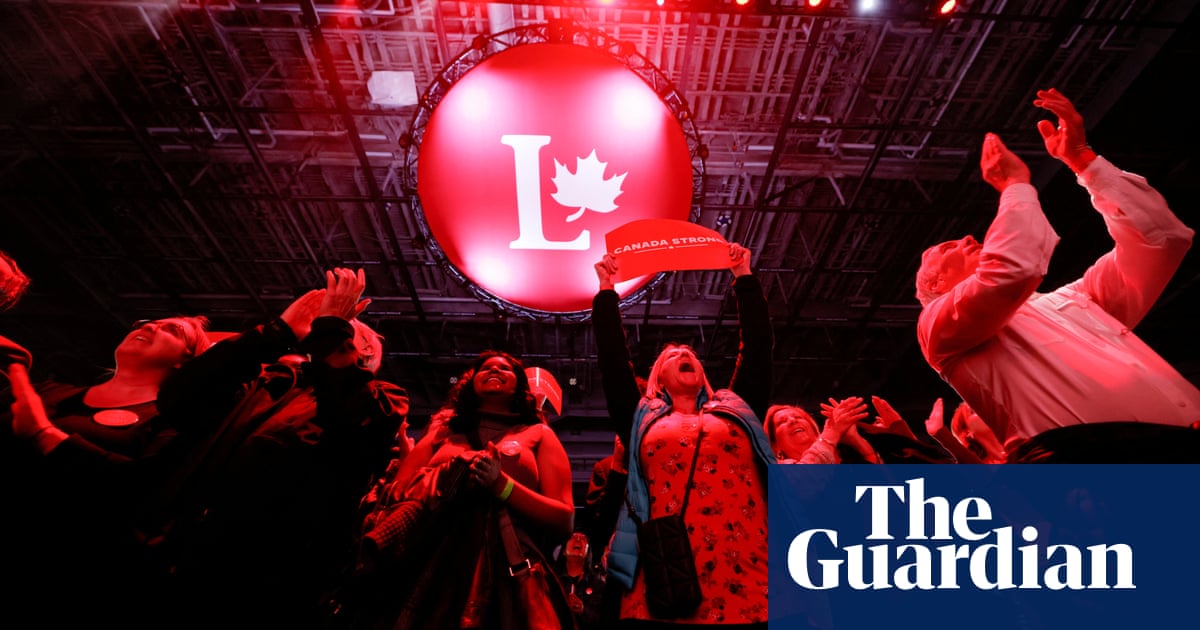Canada’s Liberal party has won a fourth term, capping a miraculous political resurrection for the party – and marking a landmark victory for former central banker and political noviceMark Carneyas he prepares to face off against US president Donald Trump.
Late on Monday, the Liberals had won or were leading in enough seats to prevent any other party from forming government, according to the national broadcaster CBC. As results from Canada’s Atlantic provinces and vote-rich Quebec and Ontario came in late on Monday, supporters at the Liberals’ election night party erupted in cheers.
It was not immediately clear if the Liberals will have enough seats for a majority government. A minority government would means Carney’s party will need the support of political opponents to govern. After a narrow victory at the previous federal election, the Liberals relied on the leftwing New Democratic party to help it pass legislation.
For the Liberals, the win marksa remarkable recovery for a party that was, until recently, on track for electoral devastation. Carney’s predecessor Justin Trudeau served as prime minister for nearly 10 years, but the twilight of his leadership was marked by repeated threats of mutiny, bitter feuding and a fed-up electorate.
Until the end of 2024, internal discussions within the Liberal party were grim: under their most optimistic scenarios, they could only hope of holding Conservatives to a minority government. Outright victory was nowhere on their party’s radar.
“We were dead and buried in December. Now we are going to form a government,” David Lametti, a former Liberal Justice Minister, told CTV late on Monday. “We have turned this around thanks to Mark,” he said.
But Trump’s threats to annex the country to make it the 51st state, his belittling of Trudeau as “governor” and threats of economic coercion have all contributed to a sharp feeling of anger and betrayal towards Canada’s southern neighbour.
“The shift in polls was absolutely without precedent,” said David Coletto, head of the polling firm Abacus. ”But to see the honeymoon that followed – and the way that support held, is also unprecedented. I can’t think of like other jurisdictions around the world, where we’ve seen this kind of just complete reset. And this turns on two factors: how unpopular Justin Trudeau was, and how much of a threat and gamechanger Donald Trump has meant to Canada.”
For Conservatives, defeat marks a disappointing end for an election the party had been demanding for months. Under the leadership of Pierre Poilievre, the Tories had for the past two years seemed all-but-certain to form a government.
But within weeks of Trump’s threats and the emergence of Carney as the new Liberal leader,their party’s 25-point lead evaporated. To have come inches from victory and then to lose is likely to kick off a sombre postmortem for the party – and internal feuding over the future of the Conservative movement.
For Carney, who served as prime minister for only nine days before calling a snap election, the gambit was one in which he hoped to make history for the party. But also on the line for Carney was the prospect of making history for an entirely different reason: had he lost, he would have inherited the mantle of Canada’s shortest serving prime minister.
“I saw how Carney conducted himself and I felt like he was really a man who met the moment,” said Ian Laroque, a campaign volunteer who lives in Carney’s Ottawa electoral district. “He wasn’t a polished politician. But he’s the kind of person we need to lead the country right now: it’s not everyday you get an economist during an economic crisis.”
Monday’s vote was unusual in other ways too: for the first time in nearly 70 years, the two main parties were set to take more than 80% of the vote between them reflecting the collapse of other smaller opposition parties including the leftwing New Democratic party and the separatist Bloc Québécois.
